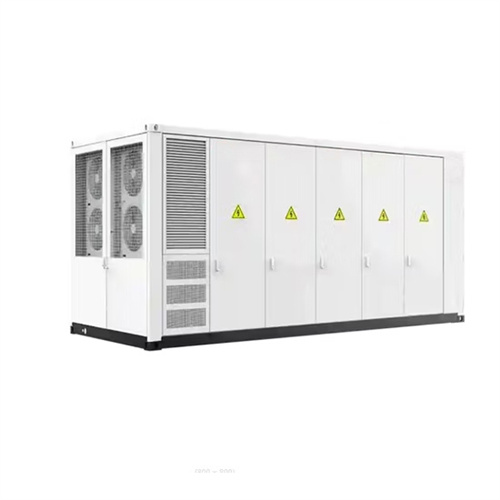Does the energy storage system need a liquid cooling system

How liquid-cooled technology unlocks the potential of energy
Liquid-cooled battery energy storage systems provide better protection against thermal runaway than air-cooled systems. "If you have a thermal runaway of a cell, you''ve got this massive heat

Air Cooling vs. Liquid Cooling: The Ultimate Energy
Energy Storage Systems (ESS) are essential for a variety of applications and require efficient cooling to function optimally. This article sets out to compare air cooling and liquid cooling-the two primary methods used in

Thermal management solutions for battery energy
Listen this articleStopPauseResume This article explores how implementing battery energy storage systems (BESS) has revolutionised worldwide electricity generation and consumption practices. In this context,

Liquid Cooling in Energy Storage | EB BLOG
Energy Storage Systems: Liquid cooling prevents batteries and supercapacitors from overheating, providing continuous operation. Furthermore, this technology has applications across wind power generation, rail

THERMAL MANAGEMENT FOR ENERGY STORAGE:
Compared to air cooling, liquid cooling is generally more effective at dissipating high amounts of heat, and can provide more precise temperature control. Liquid cooling systems are also suitable for systems that need to

How Does Liquid Cooling Extend The ESS Lifespan?
It is used in Energy Storage Systems (ESS). It cools system parts well. Traditional air cooling relies on airflow to dissipate heat. In contrast, liquid cooling uses a coolant to absorb and move heat from critical components. The coolant is

The Six Basic Types of Liquid Cooling Systems
There are six basic types of cooling systems that you can choose from to meet the cooling needs of your load. Each one has its strengths and weaknesses. This article was written to identify the different types of

Cooling Water Systems Fundamentals | Handbook | ChemTreat
Introduction to Cooling Water System Fundamentals. Cooling of process fluids, reaction vessels, turbine exhaust steam, and other applications is a critical operation at thousands of industrial

Thermal Management Solutions for Battery Energy
Liquid Cooling. Active water cooling is the best thermal management method to improve BESS performance. Liquid cooling is extremely effective at dissipating large amounts of heat and maintaining uniform

Advancements in Liquid Desiccant Technologies: A
Ghoulem M. et.al. studied the use of liquid desiccant cooling systems in greenhouses in hot climates that were powered by solar energy. Figure 2 illustrates the three process fluids in the system: liquid desiccant,

Air Cooling vs. Liquid Cooling: The Ultimate Energy Storage System
Energy Storage Systems (ESS) are essential for a variety of applications and require efficient cooling to function optimally. This article sets out to compare air cooling and

Battery Energy Storage System (BESS) | The Ultimate Guide
For a battery energy storage system to be intelligently designed, both power in megawatt (MW) or kilowatt (kW) and energy in megawatt-hour (MWh) or kilowatt-hour (kWh) ratings need to be

6 FAQs about [Does the energy storage system need a liquid cooling system ]
Are liquid cooled battery energy storage systems better than air cooled?
Liquid-cooled battery energy storage systems provide better protection against thermal runaway than air-cooled systems. “If you have a thermal runaway of a cell, you’ve got this massive heat sink for the energy be sucked away into. The liquid is an extra layer of protection,” Bradshaw says.
What is the difference between air cooled and liquid cooled energy storage?
The implications of technology choice are particularly stark when comparing traditional air-cooled energy storage systems and liquid-cooled alternatives, such as the PowerTitan series of products made by Sungrow Power Supply Company. Among the most immediately obvious differences between the two storage technologies is container size.
Why is liquid cooling better than air?
Liquid-cooling is also much easier to control than air, which requires a balancing act that is complex to get just right. The advantages of liquid cooling ultimately result in 40 percent less power consumption and a 10 percent longer battery service life. The reduced size of the liquid-cooled storage container has many beneficial ripple effects.
What are the benefits of liquid cooling?
The advantages of liquid cooling ultimately result in 40 percent less power consumption and a 10 percent longer battery service life. The reduced size of the liquid-cooled storage container has many beneficial ripple effects. For example, reduced size translates into easier, more efficient, and lower-cost installations.
What are the benefits of a liquid cooled storage container?
The reduced size of the liquid-cooled storage container has many beneficial ripple effects. For example, reduced size translates into easier, more efficient, and lower-cost installations. “You can deliver your battery unit fully populated on a big truck. That means you don’t have to load the battery modules on-site,” Bradshaw says.
Why are energy storage systems important?
Energy storage systems (ESS) have the power to impart flexibility to the electric grid and offer a back-up power source. Energy storage systems are vital when municipalities experience blackouts, states-of-emergency, and infrastructure failures that lead to power outages.
Related Contents
- Liquid Cooling Energy Storage Cabinet Sheet Metal
- Cairi Energy Storage Liquid Cooling Outdoor Cabinet
- Liquid Cooling Energy Storage Cabinet Technology
- Introduction to Industrial and Commercial Liquid Cooling Energy Storage System
- Energy storage liquid cooling system injection
- Liquid Cooling Energy Storage Cabinet Manufacturer Ranking
- Differences between air cooling and liquid cooling of energy storage cabinets
- Schematic diagram of liquid cooling of energy storage system
- Energy storage liquid cooling system disassembly tutorial diagram
- Liquid Cooling Energy Storage System Test Process
- Does a photovoltaic grid-connected power station need energy storage
- Liquid flow energy storage container transportation